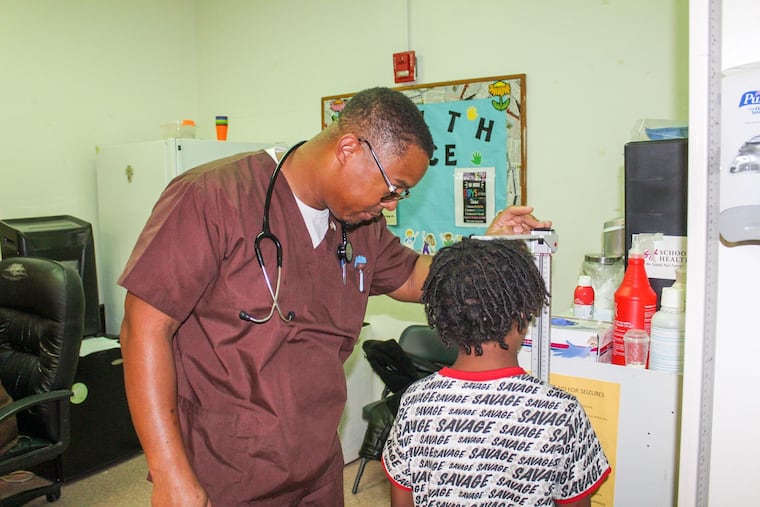With few Black male educators in local schools, a push for more diversity: ‘You get tired of being the only one’
Amid a national teacher shortage, the pool of available Black male educators is even smaller. Efforts are underway to increase the pipeline.

After working at a nursing home for several years, Leopold Brown decided to become a nurse at the Davis Family School in Camden.
Despite his initial concerns about possibly unruly or disrespectful students, Brown quickly realized the job was his calling and has stayed at the elementary school ever since. Nine years in, he remains the only Black male nurse in the South Jersey district and believes he is a role model to his students.
“It was a drastic change,” admitted Brown, 36, a U.S. Army veteran of the Iraq War, of his switch to a school environment. “I ended up loving it.”
And until last year, Brahin Tabb, a librarian at Penn Wynne Elementary in Lower Merion, was the only Black male teacher in that entire school. In the country, he’s one of roughly 600 Black men who are librarians — out of 110,000.
“We just need more diversity in the ranks of teachers,” Tabb said. “You get tired of being the only one.”
Black men like Brown and Tabb are underrepresented in schools across the country, whether in classrooms, offices, or libraries, where they are desperately needed to help improve academic outcomes for Black students.
During the 2020-21 school year, Black men accounted for 1.3% of public school teachers, according to the National Teacher and Principal Survey. Black children made up about 15% of public school students that year.
“All children need diverse educators, and Black children need them particularly,” said Monika Williams Shealey, dean of the College of Education and Human Development at Temple University. “It’s about the practice that each of those educators bring.”
A Johns Hopkins University study in 2017 found that low-income Black students who have at least one Black teacher in elementary school are significantly more likely to graduate from high school and consider attending college. Having at least one Black teacher also reduced suspensions and disciplinarian problems and the chances of the student being identified as needing special education services.
“It’s great for Black males and Black children,” said Sharif El-Mekki, founder/CEO of the Center for Black Educator Development in Philadelphia. “It actually impacts all children.”
El-Mekki, a former teacher turned activist, convened more than 1,300 Black educators last month for his organization’s Black Men Convening gathering in Philadelphia. The group, formed in 2019, wants to increase the pipeline of Black educators.
During the gathering, educators attended workshop and training sessions intended to inspire and energize them, and addressed the need for more Black educators. They talked about mental and social-emotional health and wellness. El-Mekki said he hopes to prevent the burnout — among all races — that has contributed to a national teacher shortage.
Tabb, who grew up in North Philadelphia, said the fellowship at the conference was encouraging for educators in predominantly white districts that may feel isolated. He said it is not uncommon to attend meetings where “I’m the only one in the room.”
The national One Million Teachers of Color campaign has launched an ambitious goal to add 1 million teachers of color and 30,000 school leaders of color to the country’s education workforce over the next decade. Some colleges have implemented the Call Me MISTER (Mentors Instructing Students Toward Effective Role Models) initiative to produce more teachers from diverse backgrounds.
“Too many districts are focused on recruiting and not retaining them,” El-Mekki said. “We have a lot of work to do.”
In an effort to address the shortage, the Camden Education Fund sponsored 25 Black male educators from the city’s traditional public, charter, and Renaissance schools to attend the Black Men Convening conference. The nonprofit also held a networking reception for the Camden educators and provides support and resources to help keep them in the profession, said Giana Campbell, the fund’s executive director.
“Imagine going to school all your life and never seeing anyone who looks like you?” Campbell said. “To have a teacher workforce that represents the diversity is essential.”
Mike Warren, a social studies teacher at Camden’s Eastside High School, said he takes his role seriously. His 13-year-old son who attends a school in the Trenton area has never had a Black teacher.
“I don’t consider it a burden,” said Warren, an educator for 32 years. “I still feel it’s an honor to call myself a Black educator.”
Brown, the nurse, said he sees his role as more than tending to scrapes and stomachaches — some of his students see him as a father figure. Unlike Black men in the classroom, he is often not viewed as a disciplinarian and students open up to him, he said.
Born in Jamaica, Brown enjoys sharing his personal story of overcoming adversity to encourage his students. He came to the United States when he was a teenager and enlisted in the Army when he was 17 and became a military police officer.
“The biggest thing is the love. It’s not just about being Black,” said Brown, a father of two. “The kids can see that and they know if you care. I love the kids.”